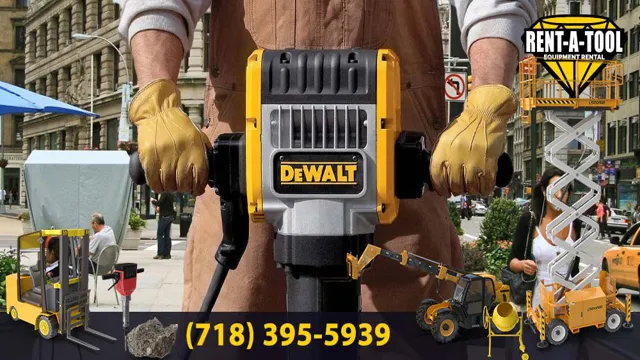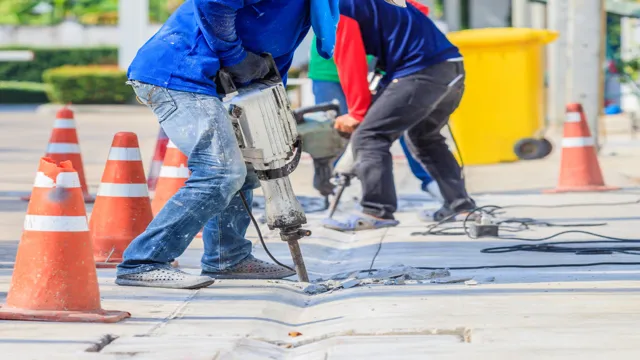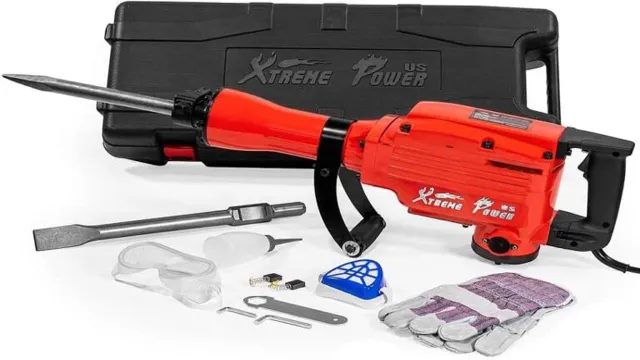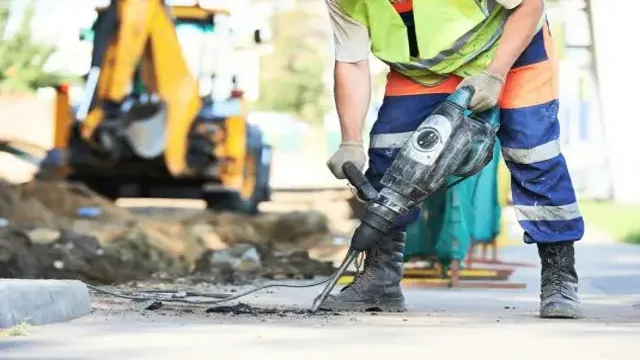What Steel Are Jackhammer Bits Made Of? Your Ultimate Guide to Choosing the Right Type

Do you ever wonder what materials make up jackhammer bits, the small but mighty tools responsible for breaking through concrete, rock, and other tough surfaces? Jackhammer bits are made of steel, but not just any steel. The type of steel used depends on the purpose of the bit, whether it is for concrete demolition, excavation, or mining. The steel must be strong, durable, and able to withstand extreme pressure and heavy impacts.
In this blog, we will explore the various types of steel used to make jackhammer bits and why they are suited for each specific application. So, let’s dive in and learn more about the powerful steel behind the bits that shape our world.
Introduction
Jackhammer bits are an essential tool used in construction and demolition activities. It can be challenging to determine what steel these bits are made of, as different manufacturers may use varying materials. However, most jackhammer bits are typically made of high-carbon steel or alloy steel, which is selected for its hardness and durability.
High-carbon steels are known for their hardness and resistance to wear, making them the perfect choice for use in jackhammer bits. On the other hand, alloy steel is a combination of various metals that create a more durable and robust material capable of withstanding intense pressure and heat. The selection of steel for jackhammer bits depends mainly on the intended use of the tool, including factors such as the type of surface being demolished, depth of impact, and frequency of use.
Explanation of Jackhammer Bits
Jackhammer bits are an essential component in the construction and demolition industries. These tools are used to break up and remove concrete, asphalt, and other tough materials. They come in various sizes and shapes, and each type is designed for specific applications.
In general, jackhammer bits are made from high-quality steel that can withstand the intense pressure and force needed to break apart hard surfaces. When selecting jackhammer bits, it’s important to consider the type of material being worked on, the size of the jackhammer, and the desired outcome. By choosing the right bit for each job, workers can ensure that they will complete the task efficiently and with minimal damage to surrounding structures.
So, whether you’re a seasoned construction worker or just starting out, understanding the different types of jackhammer bits is crucial to success on the job.

Importance of Steel in Jackhammer Bits
Steel is an integral component of jackhammer bits, and it is crucial to the performance of these powerful tools. Jackhammers are used for various purposes, such as breaking up concrete, demolishing structures, and digging through hard surfaces. The bits used in these machines are made of high-quality steel that can withstand high levels of force and pressure.
The importance of steel in jackhammer bits lies in its durability, strength, and resistance to wear and tear. The steel used in the manufacturing process needs to be of the highest quality to ensure that the bits deliver the necessary performance and last for a long time. A high-quality steel bit will provide efficient performance, reduce the downtime associated with repairs, and limit the risks of injuries and accidents.
Overall, steel is a critical component in jackhammer bits, and it plays a crucial role in the effectiveness and safety of these powerful machines.
Types of Steel Used in Jackhammer Bits
When it comes to the construction industry, jackhammer bits are essential tools used to break through concrete and other hard surfaces. But have you ever wondered what steel jackhammer bits are made of? There are actually several types of steel used in making jackhammer bits, but the most common is high carbon steel. This type of steel is known for its durability and ability to withstand high impact and pressure.
Other types of steel used in jackhammer bits include tungsten carbide, which is extremely hard and wear-resistant, and chrome vanadium steel, which is known for its strength and toughness. Ultimately, the type of steel used in jackhammer bits depends on the specific application and the level of durability and strength required. No matter the steel used, the common denominator among jackhammer bits is their ability to get the job done quickly and efficiently.
High Carbon Steel
When it comes to jackhammer bits, the type of steel used can greatly affect the performance and durability of the tool. One popular choice is high carbon steel. This type of steel is known for its strength and ability to hold a sharp edge, which is essential for drilling through tough materials like concrete and rock.
High carbon steel also has good shock resistance, making it an ideal option for jackhammer bits that are subjected to constant impact. However, it is important to note that high carbon steel can be brittle if not heat-treated properly, so it is crucial to select a high-quality bit made with the right grade of steel. Overall, high carbon steel is a reliable choice for those in need of a durable jackhammer bit.
Alloy Steel
Alloy Steel Jackhammer bits are an essential part of construction and demolition equipment, and they’re made of various types of steel. The most common type of steel used in jackhammer bits is alloy steel, which is made by combining iron with other elements like nickel, chromium, and molybdenum to give it its unique properties. The high carbon content in alloy steel makes it incredibly durable and resistant to wear and tear caused by heavy use.
It also has a greater level of hardness than other types of steel, making it an excellent choice for jackhammer bits because they need to withstand intense pressure and impact. Additionally, alloy steel retains its strength even at high temperatures, which is beneficial in situations where the jackhammer is being used for prolonged periods. Overall, the strength and durability of alloy steel make it an ideal choice for jackhammer bits, especially in construction and demolition applications that demand the most from these tools.
Tungsten Carbide Steel
Tungsten Carbide Steel is a popular material used in jackhammer bits due to its exceptional hardness, durability, and resistance to wear and tear. In addition to tungsten carbide, various types of steel are used in jackhammer bits for different purposes. For example, high-speed steel (HSS) is suited for drilling through softer materials such as wood and plastic, while chromoly steel is suitable for cutting through thick metal and concrete surfaces.
There are also hybrid materials that combine properties of both tungsten carbide and steel for added strength and performance. When choosing the right steel for jackhammer bits, it is important to consider the task at hand and the properties of the materials being drilled through to ensure efficiency and longevity of the tool. Overall, tungsten carbide steel remains a popular and trusted choice for heavy-duty jackhammer tasks due to its superior strength and endurance.
Factors to Consider When Choosing Steel for Jackhammer Bits
When it comes to jackhammer bits, choosing the right steel material is crucial to ensure longevity and durability. Most jackhammer bits are made of high-grade alloy steel, which is exceptionally tough and can withstand the heavy impacts and pressure of jackhammering. However, not all steel materials are created equal, and different factors come into play when selecting the right one for your needs.
These factors include the type of task at hand, the level of impact resistance required, and the estimated working conditions of the bit. For instance, if you’re working on harder materials like concrete or granite, you’ll need a harder type of steel with high impact resistance. On the other hand, if you’re working on softer materials like asphalt or dirt, a softer steel material will be more appropriate.
Ultimately, it’s crucial to consider all these factors and consult experts in the field to choose the most appropriate steel material for your jackhammer bits.
Application
When choosing the right steel for jackhammer bits, there are several factors you need to consider. First off, you need to think about the type of job you’ll be using the jackhammer for. Will it be a heavy-duty job, or a simple one? For heavy-duty jobs, you’ll want to opt for a steel alloy that can withstand a lot of wear and tear.
Hardened steel alloys such as S7 or D2 are ideal for this kind of job. On the other hand, if you’re just doing a light job, you can opt for a softer steel like 4140. Secondly, you need to think about the shape and size of the bit.
Generally, larger bits tend to be better for heavy jobs since they can penetrate more deeply and cover a larger surface area. However, if you’re working in a small or enclosed space, a smaller bit may be a better choice. Ultimately, the right steel and size/bit shape will depend on what you’ll be using the jackhammer for.
Cost
When choosing steel for jackhammer bits, cost is an important factor to consider. You want to get the best value for your money while ensuring that you get a high-quality product that will last. It’s important to consider the cost in relation to the performance and longevity of the steel, as well as the cost of any necessary maintenance or repairs.
Cheap steel may seem like a good option, but it could end up costing you more in the long run if it needs to be replaced frequently or if it causes damage to the rest of the jackhammer. It’s worth investing in higher-quality steel that will last longer and perform better, even if it comes with a higher price tag. By doing so, you can save money in the long run and avoid the frustration of unexpected maintenance and repairs.
So, while cost is certainly a factor to consider, it shouldn’t be the only one. Prioritize quality and longevity when choosing steel for your jackhammer bits.
Durability
When it comes to choosing steel for jackhammer bits, durability is a crucial factor to consider. The longevity of jackhammer bits depends on the quality of the steel used, which directly affects the ability to withstand heavy and continuous use. Higher quality steel, such as chromoly alloy, can provide excellent durability, even when subjected to challenging conditions.
Additionally, the surface hardness and resistance to wear are other essential factors that come into play when selecting steel. Heat treatments can also significantly improve the durability of steel and prevent cracking or breaking under high stress. In short, when choosing steel for jackhammer bits, it’s imperative to consider the grade of the steel used, the surface hardness, wear resistance, and heat treatment methods, all of which directly impact the durability of the finished product.
Conclusion
In conclusion, the material used to forge jackhammer bits is no ordinary steel. It’s tough, durable, and capable of breaking through solid concrete like a hot knife through butter. It’s not just any steel; it’s a special blend of iron, carbon, and other alloys designed to withstand the intense pressure and impact of jackhammering.
In other words, when it comes to jackhammer bits, you can’t just use any old metal. You need something as tough as nails, or in this case, as tough as steel.”
FAQs
What is the common steel used in making jackhammer bits?
Most jackhammer bits are made from high-grade, heat-treated steel such as high-speed steel (HSS) or alloy steel.
Are there any jackhammer bits made of carbon steel?
Yes, some jackhammer bits are made from carbon steel which may be cheaper but not as durable as HSS or alloy steel.
Can jackhammer bits be re-sharpened?
Yes, some jackhammer bits can be re-sharpened using a specialized grinder, but it may affect the durability and performance of the bit.
What is the average lifespan of jackhammer bits?
The lifespan of jackhammer bits depends on several factors such as the type of steel used, the intensity and frequency of usage, and the nature of the material being drilled. However, on average, a jackhammer bit can last between 100 to 400 drilling hours.
What are the signs that a jackhammer bit needs replacement?
Some signs that a jackhammer bit needs replacement include reduced drilling speed or power, increased vibration or wobbling, chipping or cracking on the bit, or the inability to penetrate a material.
Do all jackhammer bits fit different types of jackhammers?
No, jackhammers come in different sizes and configurations, and their bits also vary in size and shape. It is important to match the specific bit to the jackhammer model and type.
What is the best way to prolong the lifespan of jackhammer bits?
Proper maintenance and care can significantly extend the lifespan of jackhammer bits. This includes regular cleaning after each use, avoiding overheating, and using the right type of lubricant.







